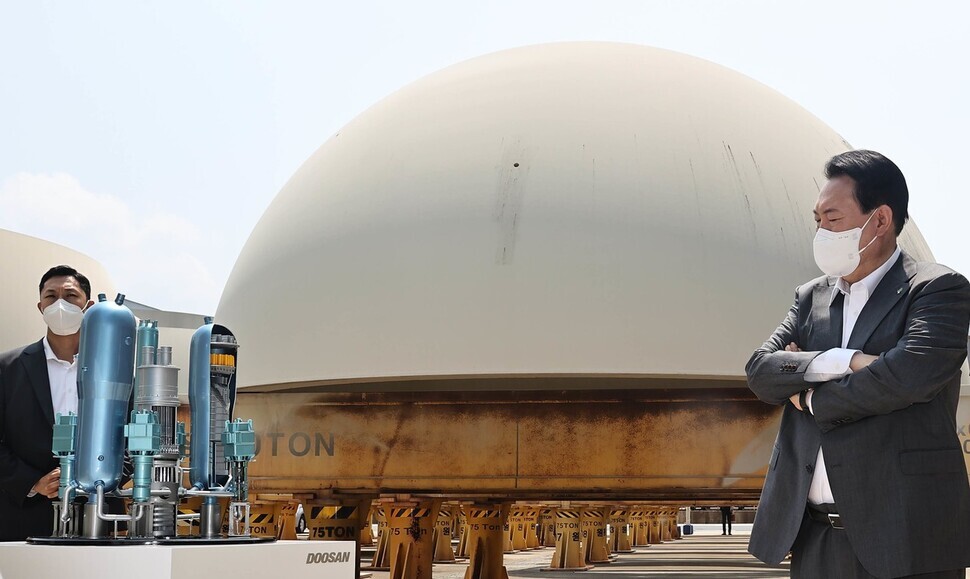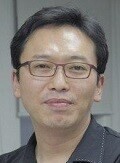hankyoreh
Links to other country sites 다른 나라 사이트 링크
[Column] 50 years of fallout from Yoon’s nuclear power fetish


Let’s start with a hypothetical. Five years ago, domestic automakers dove headfirst into the competition of electric vehicle development. Imagine someone watching this and letting out a long sigh, saying, “If we hadn’t acted like fools for the past five years and had established a more robust ecosystem for internal combustion automobiles, I bet we wouldn’t have any competition right now.” Now imagine that someone is not some average Joe, but in fact the most powerful person in the country. What would the media have said?
What’s surreal is that this really did happen. President Yoon Suk-yeol visited Doosan Enerbility (formerly Doosan Heavy Industries), one of the biggest domestic nuclear power companies, in Changwon, South Gyeongsang Province, on June 22. There, he said, “If we hadn’t acted like fools for the past five years and had established a more robust ecosystem for nuclear power plants, I bet we wouldn’t have any competition right now.” Some major media companies even applauded this remark.
If Hyundai Motors saw the trend toward electric vehicles among global automobile companies as a golden opportunity and went all-in on developing internal combustion automobiles, everyone would call the company foolish. Both the president and the media should be well aware that laying claim to the internal combustion automobile industry would be like laying claim to an ownerless, all-but-empty mountain whose ecosystem, once painstakingly cultivated, would only amount to a metaphorical Galapagos — isolated and lacking compatibility with the outside world.
At the industry level, going electric is a matter not of the climate crisis but of having to respond to a changing market, of having to become the fittest in order to survive. Now, electric vehicles are superior to internal combustion automobiles in terms of performance as well as cost-effectiveness.
A look at internationally recognized data confirms that nuclear power falls behind internal combustion automobiles in terms of market competitiveness. In the last decade, the generation cost of solar power and wind power fell by 89% and 70%, respectively. In contrast, nuclear power has become 26% costlier.
The global cumulative installed capacity for solar and wind power is already double that of nuclear power. The figure for solar power jumped from 39 gigawatts in 2010 to 942 gigawatts in 2021, while the figure for wind power grew from 198 gigawatts in 2010 to 845 gigawatts in 2021. Meanwhile, the figure for nuclear power has remained stagnant, lingering at 381 gigawatts in 2010 and at 404 gigawatts in 2021.
In 2020, solar and wind power became the cheapest new sources of power in areas where at least two-thirds of the world’s population live.
The reason nuclear power has been able to maintain its global output is China. In the last 20 years, China has multiplied its nuclear power generation capacity by 23 times. China’s not the only one bumping up their nuclear power input — Russia, India and South Korea have increased their outputs as well. Meanwhile, the US and France, the first and second in terms of nuclear power generation, have been reducing their reliance on the energy source. Japan’s nuclear power output is less than half of what it was 10 years ago, and there are only four nuclear power plants still in operation in Japan.
Renewable energy accounts for over 40% of the power generated in major European countries, and the figure exceeds 20% in the US, Japan and China. China invested US$91 billion in renewable energy in 2018 while investing a mere US$6.5 billion in nuclear power. However, renewable energy only accounts for 6% of the power generated in South Korea.
But listing all these figures one after another would be a waste of paper. If all this explanation merely prompts Yoon to blink his eyes in incomprehension, that would be “because [he] has ears that do not want to listen,” to borrow a phrase from poet Choi Seung-ja.
What’s even more tragic is that Yoon said he would pour taxpayer money “by the bucket” to establish an isolated Galapagos of nuclear power technology. In essence, he’s saying he’ll abandon the renewable energy industry. It’s like saying one will focus on major subjects like language arts, English, and math (electric vehicles) in order to get good scores in subjects that require rote memorization (internal combustion automobiles).
Considering this, it would be pointless to ask Yoon the same question that was posed to him during a televised presidential debate, specifically: How will you respond to RE100, an initiative to bring global corporations to commit to 100% renewable electricity?
There’s nothing better than the MacGuffin and other tricks to evade answering awkward questions like this. In fact, Yoon has been blabbering about how green an energy source nuclear power is for it to have been included in the EU’s “green taxonomy.”
But Yoon has been silent about the fact that a standing committee of the EU practically voted down the final draft of the green taxonomy a few days before his visit to Doosan Enerbility. The Moon Jae-in administration’s “nuclear phase-out policy in name only” that supposedly resulted in astronomical deficits for the Korea Electric Power Corporation has been the lone scapegoat brought up time and time again for the past five years.
The Yoon administration’s fetish for nuclear power is already posing incredible threats. Yoon’s statement that “the nuclear power industry is currently at war, and the battlefield is in ruins after the explosion of a bomb of the nuclear phase-out” and that “the bureaucratic mindset that puts emphasis on safety should be abandoned during war” is an unconscious manifestation of nuclear power fetishism, a cruel metaphor that would never have been uttered if Yoon thought even for a second about the peace of mind and safety of people living in parts of South Korea with the highest density of nuclear power plants in the world.
A fire at a nuclear power plant cannot be put out by man. The Fukushima nuclear power plant in Japan is still burning, 11 years after the nuclear accident there. Yoon’s foolishness in the next five years will cause a crisis that will last for at least the next 50 years.
Please direct questions or comments to [english@hani.co.kr]

Editorial・opinion
![[Column] Season 2 of special prosecutor probe may be coming to Korea soon [Column] Season 2 of special prosecutor probe may be coming to Korea soon](https://flexible.img.hani.co.kr/flexible/normal/500/300/imgdb/original/2024/0426/3317141030699447.jpg) [Column] Season 2 of special prosecutor probe may be coming to Korea soon
[Column] Season 2 of special prosecutor probe may be coming to Korea soon![[Column] Park Geun-hye déjà vu in Yoon Suk-yeol [Column] Park Geun-hye déjà vu in Yoon Suk-yeol](https://flexible.img.hani.co.kr/flexible/normal/500/300/imgdb/original/2024/0424/651713945113788.jpg) [Column] Park Geun-hye déjà vu in Yoon Suk-yeol
[Column] Park Geun-hye déjà vu in Yoon Suk-yeol- [Editorial] New weight of N. Korea’s nuclear threats makes dialogue all the more urgent
- [Guest essay] The real reason Korea’s new right wants to dub Rhee a founding father
- [Column] ‘Choson’: Is it time we start referring to N. Korea in its own terms?
- [Editorial] Japan’s rewriting of history with Korea has gone too far
- [Column] The president’s questionable capacity for dialogue
- [Column] Are chaebol firms just pizza pies for families to divvy up as they please?
- [Column] Has Korea, too, crossed the Rubicon on China?
- [Correspondent’s column] In Japan’s alliance with US, echoes of its past alliances with UK
Most viewed articles
- 1‘We must say no’: Seoul defense chief on Korean, USFK involvement in hypothetical Taiwan crisis
- 2AI is catching up with humans at a ‘shocking’ rate
- 3Division commander ordered troops to enter raging flood waters before Marine died, survivor says
- 4Is Japan about to snatch control of Line messenger from Korea’s Naver?
- 5The dream K-drama boyfriend stealing hearts and screens in Japan
- 6Korea protests Japanese PM’s offering at war-linked Yasukuni Shrine
- 7[Column] Season 2 of special prosecutor probe may be coming to Korea soon
- 8‘Weddingflation’ breaks the bank for Korean couples-to-be
- 9“Korea is so screwed!”: The statistic making foreign scholars’ heads spin
- 10[Column] ‘Choson’: Is it time we start referring to N. Korea in its own terms?